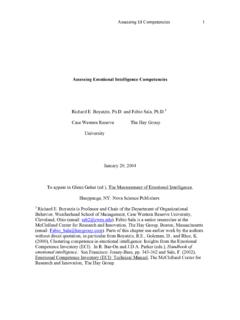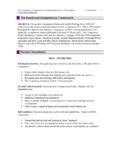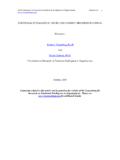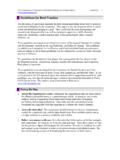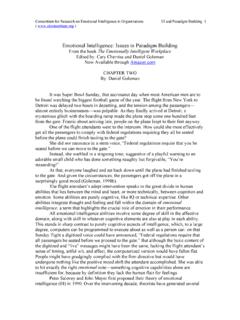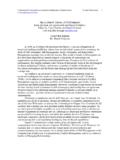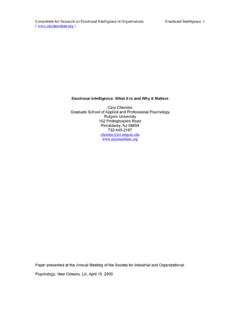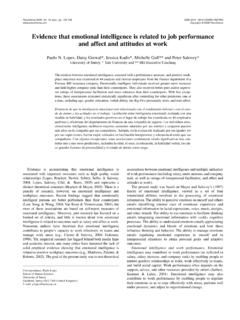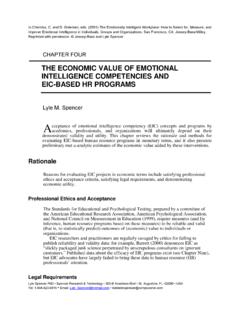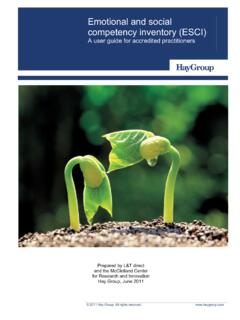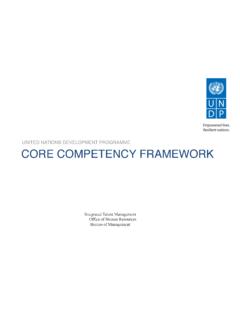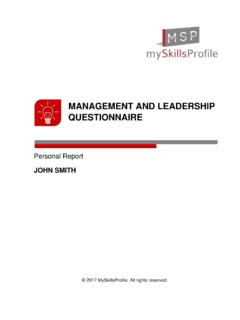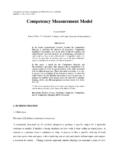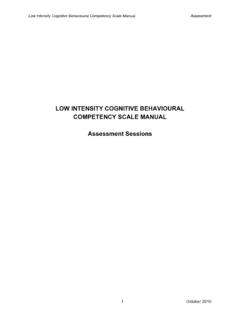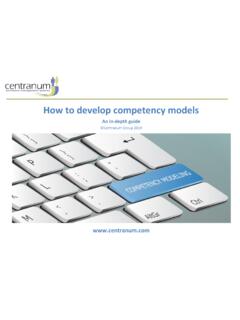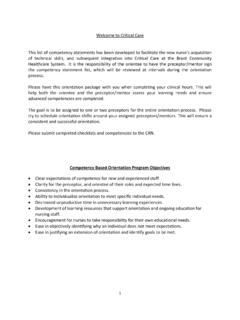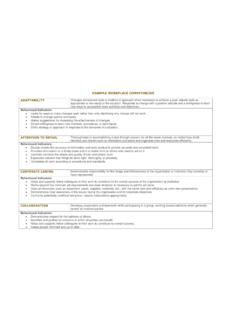Transcription of Emotional Competence Inventory (ECI)
1 Emotional Competence Inventory (ECI). Technical Manual 156245438739887. 764920582655369. 758395697739858. 273465398000298. 841115678809020. 288459873000823. 387762819910943. 377784930933234. Hay Group, McClelland Center for Research and Innovation Prepared by Steven B. Wolff, DBA. Updated November 2005.. Emotional Competence Inventory (ECI). Technical Manual Hay Group McClelland Center for Research and Innovation Updated by Steven B. Wolff, DBA*. November 2005. *The previous version of this manual (2002) was prepared by Fabio Sala, . Table of Contents Reliability Overview .. 1. Validity 1. Definition of Emotional Intelligence .. 2. Background on the 2. A Brief History of the Development of the ECI .. 2. The Need for the ECI .. 2. Emotional Intelligence 3. A Summary of Changes in ECI vs. ECI 4. Using the ECI Appropriately .. 4. Developmental uses vs.
2 Administrative uses .. 5. Scoring .. 5. Clustering of Competencies .. 5. competency 6. Use of Self Ratings .. 6. What is Considered Valid 7. Reliability ECI Internal Consistency for the ECI 9. Test-Retest Reliability .. 11. Overall Validity Study Using ECI .. 12. Criterion Validity Using ECI .. 14. Emotional Intelligence and College Principals .. 14. Emotional Intelligence and Performance in the Turkish Finance 14. Emotional Intelligence and South African Call Center Agents .. 17. EI, IQ, and Perceptions of Leadership .. 17. High Performance and High Potential at Johnson & Johnson .. 18. Emotional Intelligence and the Performance of school Principals .. 19. Leadership and Emotional 19. Emotional Intelligence and Performance: Filipino First-Line Supervisors .. 20. Emotional Intelligence and Team 20. Criterion Validity Using ECI .. 20. ECI and Sales Performance at Bass Brewers in the.
3 20. ECI and Performance with Fire Fighters and Fire Officers .. 20. Leadership, ECI , and Performance in Public Accounting 21. ECI and the performance of Division I softball coaches .. 22. ECI and the performance of Parish 22. Construct Validity Using ECI .. 22. Type A and Type B Personality in Greek Bank Employees .. 22. Myers-Briggs Type Indicator (MBTI) and ECI in 23. NEO Big Five Personality .. 25. Managerial Styles (Carulli & Com, 2003) .. 25. Emotional Intelligence Gap Scores and Managerial Styles .. 26. Emotional Intelligence Change Scores and Managerial 27. Organizational Climate .. 28. College Principals Study (Sala, 2003) and Organizational 29. Construct Validity Using ECI .. 30. 2005 Hay Acquisition Company I, Inc. All rights reserved i 0511-9889-HAYG. ECI and Organizational Climate .. 30. ECI and Irrational Beliefs .. 31. Leader EI, Emotionally Competent Group Norms, and Performance of Military Air Crews.
4 31. ECI and Follower 31. Discriminant Validity Using ECI 31. Analytical Thinking and Emotional Intelligence .. 31. Discriminant Validity Using ECI 32. Personality and Emotional Intelligence .. 32. Convergent Validity Using ECI 33. German Translation of ECI vs. Wong and Law Instrument .. 33. Emotional Intelligence Training and Development Using ECI .. 33. Stress and Emotional 35. Feedback: Self/Total Others Discrepancy Using ECI 36. Accurate Self-Assessment Study .. 37. Research on Demographic Variables Using ECI .. 38. Promotions .. 38. Emotional Intelligence and 38. Emotional Intelligence and Job Characteristics .. 38. Gender and Emotional 39. Research on Demographic Variables Using ECI .. 40. Age, Gender, Educational Level and Emotional 40. Age, Gender, Ethnicity and Emotional Intelligence .. 40. ECI Descriptive Descriptive Statistics for the ECI 41.
5 Inter- competency 42. ECI Norms: Gender (Average-Item) .. 44. Norms: Gender (Scored) .. 45. Norms: Job Function (Average-Item 1 of 2).. 46. Norms: Job Function (Average-Item 2 of 2).. 47. Norms: Job Function (Scored 1 of 2).. 48. Norms: Job Function (Scored 2 of 2).. 49. Norms: Geography (Average-Item 1 of 2).. 50. Norms: Geography (Average-Item 2 of 2).. 51. Norms: Job Level (Average-Item 1 of 2).. 52. Norms: Job Level (Average-Item 2 of 2).. 53. Norms: Job Level (Scored 1 of 2).. 54. Norms: Job Level (Scored 2 of 2).. 55. ECI Frequently Asked Questions ..56. ECI-U ..58. Validation Studies for the 58. Construct Validity .. 58. Emotional Intelligence and Student 58. Emotional Intelligence and Work 58. Demographic Studies Using the ECI-U .. 59. ECI-U and Gender .. 59. APPENDIX: Norms and Descriptive Statistics for the ECI ..67. 2005 Hay Acquisition Company I, Inc.
6 All rights reserved ii 0511-9889-HAYG. Internal Consistency for the ECI 67. ECI Descriptive Means and Standard 68. Inter- competency 69. ECI Overall 70. Norms: 72. Norms: Job 73. Norms: 74. Norms: Job 75. 2005 Hay Acquisition Company I, Inc. All rights reserved iii 0511-9889-HAYG. 2005 Hay Acquisition Company I, Inc. All rights reserved 0511-9889-HAYG. Summary This technical manual provides background information on the ECI , reliability and validity information, and norms. Reliability Overview Internal consistency reliability (Cronbach's alpha) of the instrument has been found to be good for total others ratings. The reliabilities range from .68 (Transparency) to .87 ( Emotional Self Awareness) with an overall average reliability of .78. The reliabilities of the self rating were not as good and ranged from .47 (Conflict Management) to .76 (Inspirational Leadership) with an overall average reliability of.
7 63. Validity Overview A number of studies are presented in the manual that highlight the criterion and construct validity of the instrument. Research presented shows that ECI is related to outcomes such as an individual's life success (Sevinc, 2001), department performance (Nel, 2001), perceptions of leadership in a group (Humphrey, Sleeth & Kellet, 2001), sales performance (Lloyd, 2001), fire fighter performance (Stagg & Gunter, 2002), softball coaches win/loss record (VanSickle, 2004), and parishioner satisfaction (Brizz, 2004). The ECI also shows good construct validity and is related to measures such as the MBTI sensing/intuiting and thinking/feeling dimensions but not the introversion/extraversion and judging/perceiving dimensions as expected (Burckle, 2000b). The ECI is correlated with affiliative and coaching leadership styles but not coercive and authoritative styles (Carulli & Com, 2003).
8 It has also been shown that ECI is related to climate (Sala, 2003) although there is also evidence that ECI may not be directly related to climate but rather it affects climate through leadership style. Other research shows the ECI related to group Emotional intelligence (Stubbs, 2005), and negatively related to irrational beliefs as hypothesized (Welpe, Tumasjan, Stich et al., 2005). Two studies examined the discriminant validity of the ECI, , that it is different from other concepts. The research shows that the ECI is not correlated with either critical thinking (Murensky, 2000) or personality traits as measured by Eysenck's Personality Questionnaire (Zadel, 2004). Byrne (2003) conducted an overall validity study of the ECI using the self-scored version. He concluded the instrument shows good construct, discriminant, and criterion validity.
9 2005 Hay Acquisition Company I, Inc. All rights reserved 1 0511-9889-HAYG. Introduction Definition of Emotional Intelligence Emotional intelligence is the capacity for recognizing our own feelings and those of others, for motivating ourselves and for managing emotions effectively in ourselves and others. An Emotional Competence is a learned capacity based on Emotional intelligence that contributes to effective performance at work. Background on the ECI. A Brief History of the Development of the ECI. The ECI is a 360-degree tool designed to assess the Emotional competencies of individuals and organizations. It is based on Emotional competencies identified by Dr. Daniel Goleman in Working with Emotional Intelligence (1998), and on competencies from Hay/McBer's Generic competency Dictionary (1996) as well as Dr. Richard Boyatzis's Self-Assessment Questionnaire (SAQ).
10 Hay/McBer's Generic competency Dictionary was originated by Lyle and Signe Spencer as documented in their book Competence at Work (1993), and revised by psychologist David McClelland after an extensive review of the literature. It is based on over 20 years of research initiated by Dr. McClelland (1973) with his seminal article, Testing for Competence rather than Intelligence. Hay/McBer and other researchers have established that every core competency in the Dictionary reliably differentiates performance in a variety of organizations. The Self-Assessment Questionnaire was initially developed by Dr. Boyatzis in 1991 for use with MBA. and executive students to assess competencies in the Generic Model of Management used at the Weatherhead School of Management, Case Western Reserve University. The SAQ has shown a high degree of construct validity against a variety of behavioral and questionnaire measures.
